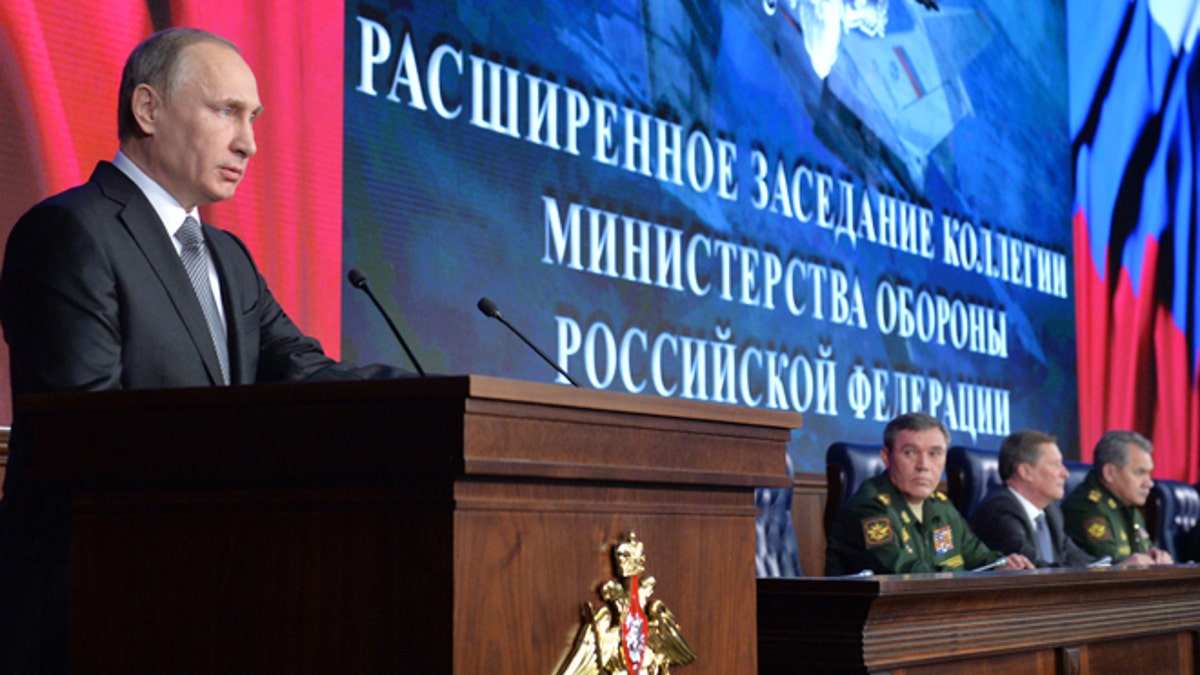
Dec. 11, 2015: Russian President Vladimir Putin, left, delivers his speech during a meeting with top military officials in Moscow, Russia. Putin said the Russian military action helped change the situation in Syria, supporting the Syrian army offensive. (Sputnik/Kremlin Pool Photo via AP)
MOSCOW – President Vladimir Putin on Friday vowed to further modernize Russia's military and said that its forces in Syria will "immediately destroy" any target threatening them, a strong warning to Turkey following its shoot-down of a Russian warplane at the Syrian border.
Speaking at a meeting with the top military brass, Putin named "strengthening of the combat potential of strategic nuclear forces and the implementation of space defense programs" as a key priority. Defense Minister Sergei Shoigu said that the military has received 35 intercontinental ballistic missiles this year and put forward equally ambitious weapons modernization plans for next year despite Russia's economic downturn.
Without naming Turkey, Putin said the military should respond in full force to any further "provocations." He said the Russian military base in Syria has been beefed up with additional aircraft and air defense weapons.
"I order you to act in the toughest way," Putin said. "Any targets threatening the Russian groups of forces or our land infrastructure should be immediately destroyed."
The downing of a Russian bomber by a Turkish fighter jet on Nov. 24, the first time a NATO member shot down a Russian plane in more than half a century, has badly strained the relations between Moscow and Ankara.
Turkey said it downed the Russian plane after it violated its airspace for 17 seconds despite repeated warnings, while Russia has insisted the plane had remained in Syrian airspace. Putin has denounced the Turkish action as a "treacherous stab in the back" and ordered the deployment of S-400 long-range air defense missile systems to a Russian base in Syria.
Russia also has introduced a slew of economic sanctions, including a ban on sales of tour packages to Turkey, an important trade partner and the No. 1 destination for Russian tourists.
Turkey's foreign minister said Friday his country is refraining from responding to Russian efforts to hit back at Turkey over the plane's downing, but added that the country's patience has limits. "If we are not responding to all that they have done until now, it is not because we are afraid or because any psychology of guilt," Mevlut Cavusoglu told NTV television.
Putin said the Russian military action in Syria is essential for protecting Russia from extremists based there, adding that fending off that threat is the main goal of the air campaign Russia launched on Sept. 30. He has previously said that between 5,000 and 7,000 citizens of Russia and other ex-Soviet nations have joined the Islamic State group.
"Our action there hasn't been prompted by some abstract geopolitical interests or a desire to train and test new weapons systems, which is important too," Putin said. "The main thing is to avert a threat to the Russian Federation."
The U.S. and its allies have accused Russia of targeting opposition groups fighting Syrian President Bashar Assad's government instead of focusing on its declared goal, the IS.
Putin claimed Friday that along with supporting the Syrian army, Russia also has provided support for some units of the Free Syrian Army, a group opposed to Assad.
"We have provided air support for them as well as the Syrian army and also supplied them with weapons, ammunition and supplies," Putin said.
Shoigu said Russian warplanes have flown 4,000 combat sorties in Syria since the launch of the air campaign there, destroying 8,000 "terrorist" targets.
He added that Russia moved 214,000 metric tons of supplies to support the military action in Syria and helped restore a tank repair factory in the Syrian province of Homs, which he said is now working at full scale.
Russia's ambitious arms modernization program has continued at full pace this year, even though low oil prices and Western sanctions drove the economy into recession this year.
Shoigu said the military has received 35 new intercontinental ballistic missiles, 243 aircraft, 90 air defense systems and 1,172 tanks and other armored vehicles so far this year.
He added that the navy received two new nuclear-powered submarines equipped with intercontinental ballistic missiles, two general-purpose submarines and eight surface warships so far this year.
The military also expanded its presence in the Arctic, building several new bases and other military facilities there.
